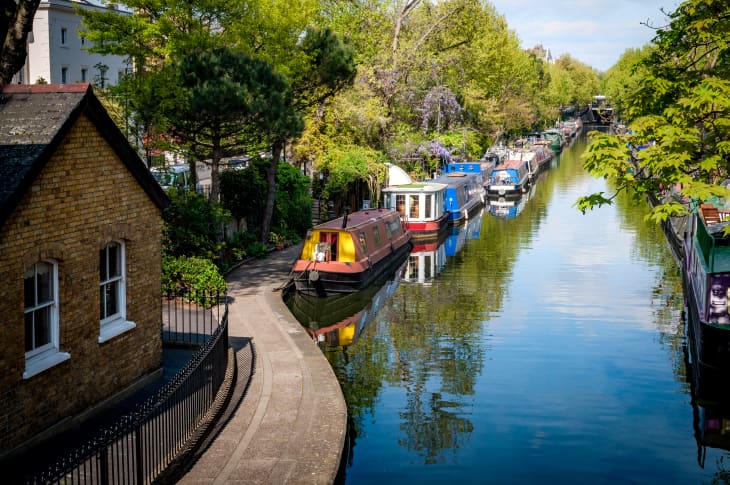5 Things I Never Expected to Learn While Living on a Houseboat in London

You’ve no doubt seen the filtered photos of tiny houses and #vanlife on Instagram: Idyllic sunsets shot through back windows, coupled with captions expounding the latest space-saving solutions and thrifty hacks.
I admit I was captivated by the idea of paring down my belongings and living small. So in 2019 when I was set to relocate to London—where rental costs are notoriously high—I was already primed with the belief that budget-friendly alternatives existed. And I was delighted to be introduced to London’s #vanlife equivalent: houseboats. Now, like a small subset of London’s population, I live permanently on a “narrowboat” moored in the city’s canal network. But in the beginning, as I approached my new way of living, there were a few realities of the lifestyle that I could only have learned along the way.
I could get a “mortgage” to buy a houseboat
With little savings, my first hurdle was buying the boat. Narrowboats are 7-feet wide, range from 20 to 70 feet long, and prices start around £20,000 (or about $26,000) for one in “project” condition. They run considerably higher if you want something more move-in ready. I thought it would take me years to save up until I approached my bank about getting a personal loan. In the same way a mortgage allows you to buy a house, I was able to gradually buy my boat with monthly repayments.
I became hyper aware of how much power I used and waste I produced
Unlike in a house, you’re extremely conscious that the water from the tap is a finite resource and the refilling of the water tank needs to be coordinated around your schedule. You have to connect gas tanks and generate electricity—and if you’ve run out, then the stove won’t light and your laptop won’t charge. Perhaps most bizarrely, at seemingly random times during the week, I am alerted by a loud repetitive drumming sound. This is the engine of the historical “coal boat” passing my stretch of the canal. From it, I buy gas, coal, and other essentials to keep my boat running. While these things can feel inconvenient, it has also transformed the way I think about what I consume: what do I consider necessary or just a luxury?
A houseboat isn’t just a quirky home, it’s a lifestyle
Don’t be fooled in thinking that it’s all yoga on the roof—living on a boat can be like having an extra part-time job. There are things you have to consider that you wouldn’t when living in a house on land. These range from having to physically take your boat out of the water every few years for repainting to getting used to having “boat legs” when you’re back on land. The little community of boaters surrounding me are experiencing life in the city in a different way to those in the high-rises around us.
Luxuries aren’t easy to come by, but it doesn’t mean you can’t have any
“How do you shower? How do you cook? How do you stand up without bumping your head? Isn’t it freezing?” These are the kinds of questions that people asked when I revealed I lived on a boat in central London. I was delighted when I found a boat with a washing machine, a bath, and a central heating system. The comforts of a regular house are available—they’re just modified, so you don’t have to give up all of the things you loved about life on land. These things, along with stylish interior decor, can make for a desirable floating apartment.
Boat life isn’t cheap, but it gives you so much freedom
As mentioned, I was drawn to boat life by the idea of it being low cost. In one sense, this is true: there is pretty much no cheaper way to own “property” in London. But you do have to be prepared for hidden maintenance costs that can crop up unexpectedly. If you want to moor your boat permanently in central London without having to move it, you will have to pay a premium price to do so. Yet that price means having no landlord: the freedom to decorate without fear of a deposit being deducted, being close to nature in an urban landscape, the ability to relocate and take my house with me, and the feeling of security that comes with owning a home. Simply put? It’s worth it.